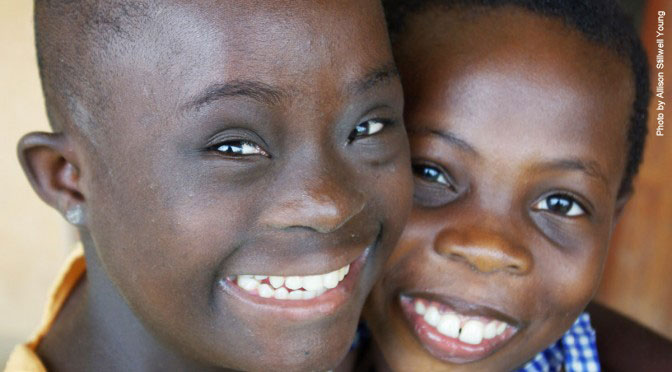Each year, people around the world celebrate Down syndrome and advocate for awareness on March 21, World Down Syndrome Day. While we have made incredible gains towards acceptance of people with Down syndrome, there is still a very long way to go. The vast majority of babies who receive a prenatal diagnosis of Down syndrome are still aborted. Adults with Down syndrome are still discriminated against, and treated as less valuable than people with the typical number of chromosomes. Politicians and pundits openly call for the forced abortion and euthanization of people with Down syndrome. Ignorance still abounds about Down syndrome, and the only way to combat ignorance is with information.
Here are five things to know about Down syndrome for World Down Syndrome Day…
1. It’s not rare.
The idea persists that Down syndrome is not common. This may be because for people who are adults now, people with Down syndrome weren’t seen much. 50 years ago, people with Down syndrome were often institutionalized; 20 years ago, they weren’t institutionalized, but were placed in separate classrooms and rarely, if ever, interacted with peers without special needs. So it’s hard to get a real idea of how common Down syndrome actually is. It’s one of the most commonly occurring birth defects, and the most common chromosomal abnormality. 1 in every 700 babies will have Down syndrome; there are currently around 400,000 people with Down syndrome living in the United States alone.
2. People with Down syndrome are not all the same.
It’s easy to lump people with Down syndrome into one category, but it’s wrong to do so. Down syndrome typically does lead to various developmental delays, but people with Down syndrome have varying abilities, intellects, and personalities… just like everyone else in the world. People with Down syndrome also do not all look the same. There are some physical features associated with Down syndrome, but not everyone with Down syndrome will have them. People with Down syndrome will resemble their family members more than they will another person with Down syndrome.
3. Medical advances have greatly improved life for people with Down syndrome.
One of the most commonly named reasons people choose to abort their preborn children with Down syndrome is fear that their quality of life will be poor. They associate Down syndrome with a myriad of medical problems and crippling intellectual disability. But the reality is that there has never been a better time for people with Down syndrome than right now. Yes, people with Down syndrome are at higher risk for various medical issues, like heart defects, cancer, and thyroid disorders, to name a few. However, medical advances have drastically changed how these issues are treated. In just 20 years, the life expectancy for people with Down syndrome has skyrocketed from 25 in 1983 to 60 now. As for developmental delays, children with Down syndrome now receive early intervention services starting at a very young age, giving them the best chance they’ve ever had at reaching their full potential. It’s not that people with Down syndrome have not been able to be successful before, but they’re now being given tools to help them overcome their developmental delays that weren’t available before.
4. People with Down syndrome lead fulfilling lives.
Remember the quality of life argument? There’s this image the public has of people with Down syndrome as people who will never work, never have meaningful lives, never move out of their parents’ homes or accomplish anything. But this could not be less true. People with Down syndrome work, live on their own, have friends, and get married. They go to school and graduate from college. They are able to have relationships with friends and significant others. Studies have shown that the vast majority of people with Down syndrome are happy with themselves and their lives. They are not suffering and need to be taken out of their misery.
5. They are just as valuable as anyone else.
It doesn’t matter what someone’s cognitive abilities are, how long his life is, or how prestigious her job is. Every person has inherent value and dignity, and that includes people with Down syndrome. People with Down syndrome have complex feelings like everyone else. They participate in their communities; they love and laugh and cry. They have family, friends, and spouses. People with Down syndrome, like all human beings, are worthwhile and their lives have meaning… and deserve to be protected, whether they are born or preborn.








